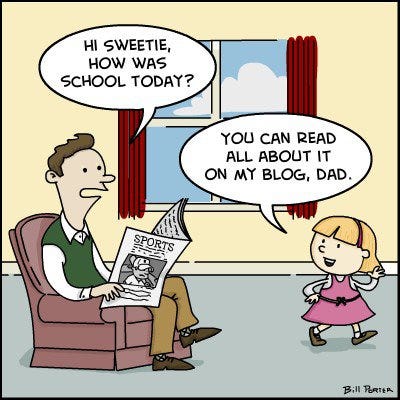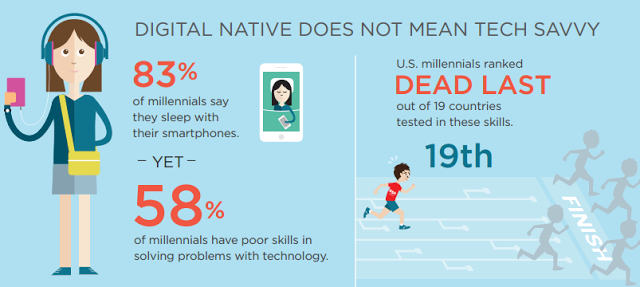
The crux of Boyd’s chapter is that “digital native” is not a term that can describe every person belonging to a specific generation. Just because a person has used technology does not mean that they are comfortable with all aspects of it. People’s experiences with technology are just as varied as their experiences with other parts of life. The purpose of separating digital natives from the digital immigrants is to see how those whose lives revolve around technology differ from those who have to work to adapt to it. It should not be used to delineate which age groups of people are better or worse at navigating digital media.
Prensky’s work makes claims that Boyd attempts to refute. Prensky continuously refers to “all” youth as being able to navigate the digital world, and claims that they “all” have undergone changes that separate them from older generations. He implies that if a person is a “digital immigrant” they will never be able to teach those who are “digital natives”. He makes the very generalizations that Boyd argues are harmful. In categorizing educators as the immigrants and students as the natives, Prensky pits people against each other when they should be brought together, and unfairly labels those who may not be deserving of such titles.
Boyd writes, “by not doing the work necessary to help youth develop broad digital competency, educators and the public end up reproducing digital inequality because more privileged youth often have more opportunities to develop these skills outside the classroom” (180). I have found the assumption that kids growing up in the modern era automatically have the digital literacy to navigate technology to be quite inaccurate. When we assume that students know something, we miss the opportunity to ensure that they actually do.
Though I don’t think the terms themselves are particularly harmful, what we do with these assumptions is key. I look at my own students who have such poor typing skills that one might think they have never typed before. Yet there is an assumption that they should be good at typing without ever having learned how, simply because of when they grew up. They have access to so many digital resources, yet often don’t know what to do with the influx of media. Calling all youths “digital natives” disadvantages those who are not as competent as others.

What we need to do is instruct rather than label. We can’t expect kids to pick up literacy skills on their own, just like we don’t expect them to be able to do algebra just because they’re sitting in an algebra classroom. As Sir Ken Robinson said in his TED Talk, just because a person is taught something, it doesn’t mean they have learned it. Educators have to be aware of digital media literacy deficits and actively ensuring that students have the skills they need. This also means that educations themselves need to become more digitally literate.
References:
Boyd, Danah. It's Complicated: the Social Lives of Networked Teens. Yale University Press, 2015.
Prensky, Marc. Digital Natives, Digital Immigrants. Marc Prensky, 2001.
HI Ally,
ReplyDeleteI agree with you when you say that we need not label kids, but to instruct them. I've had a lot of students this past year that struggled logging into forums such as Google classroom, or anything through a web browser. They would say they only knew how to access apps that were downloaded onto an IPad. So I understand and agree with your thoughts there! Yes, this means that teachers need to become more "digitally literate". But I wonder how we can do if we weren't in classes such as CURR 550. I know the district I worked in offered some PDs on digital tools, but it was simply on the ones that most teachers used. What about new ideas? How can we get our districts to provide us with more innovative ideas? Or is it simply just up to us?
When you say we need to instruct and not label, you are spot on. I mentioned in my blog that I had to work hard to be able to read and write correctly in English, and that it wouldn't come without the help of my teachers and so why wouldn't we help with learning technology? Yes they are growing up around it, but why should we assume they know the right/wrong when using digital media? We need to find a happy medium where we can work with students, and students can work with us, to get there. I appreciated your article also on making sure we as teachers stay literate and up to date on media and technology. We have to! It is an ever changing, fast paced world and we have to be at the forefront. We have to have a hands-on approach and open mind to make sure we are on the right path with our students regarding technology.
ReplyDeleteAlly, I agree that we all need to keep up with the digital wave, as it's so important for us to keep our students targeted for achievement in their world. I am an older person who feels the struggle to keep up with the fast pace of constantly NEW technology. It takes me longer to digest and process than it used to....lol I think it can be beneficial to me in connecting and being aware of those students sitting in front of me who struggle with processing, too.. OR simply are behind in technological knowledge/experience/access...
ReplyDelete